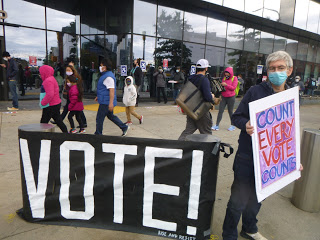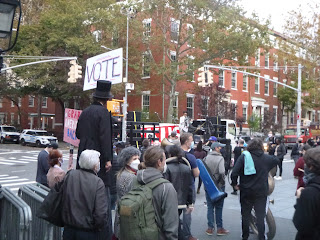All week, people planning,
planning to vote, to get out the vote, to protect the vote, to create new
stories for our waning democracy.
Watching the looming Trump Parade,
wondering
“How
to Beat an Election-Related Power Grab ?”
On Friday, Babs and I make plans
to travel to Pennsylvania for election day, looking at the trees, talking in Tompkins
Square Park.
In front of the Grace Gallery, JK
was holding court on Ave C, people sharing stories. Passers by, anyone, on the street, everyone
was invited.
I know Armond from the gardens.
When I arrived, he was sharing a
story about his days in New Orleans five decades prior.
“Over the last few days, I have been
reflecting on my life, when I was young and dumb, not realizing that I would
one day be an old man reflecting.
It was almost impossible to think
about.
“Tell us about your first love,”
asks JK.
Armond turned back to those days
in New Orleans.
“That was the era of a lot of
change.
Peace and love mixed together.
In high school, I dated this beatnik.
I had a huge crush on her, huge.
But Catholic indoctrination got in
the way.
Designed to make you afraid of
life.
I was indoctrinated to be afraid.
I self-sabotaged. And it’s a pattern.
Its like watching a horror movie.
And that new judge, Amy, the woman
is right out of this.
The Catholic brainwashing.”
“So how did it go?” I ask.
“You are making these patterns. They follow you into adulthood.
You think you’re recovered. This self-defeating thinking comes back.
I must have been out of my mind,
going back to these patterns.
The nuns get a hold of you
My dad was a reactionary nut case.
Destroying his life and this sensitive
child, me?
“What do you believe in?
“Mother earth.”
“Maybe there is a new story…” I suggest.
“She helped me realize what life
could be.
Beauty, sensuality, love.”
Armond finished his story.
I tell everyone about going to New
Orleans as a kid, getting high and walking all night, falling in love with everyone,
the people in the street, the jazz musicians, meeting friends at Big Daddy’s, before
returning home, growing up, going DC the day before, stopping at the Walt
Whitman rest stop, looking for a new story.”
JK chimes in:
“When Ludmilla and I drove to Reverend
Billy’s wedding, we were assigned to read a poem at the Walt Whitman rest stop.”
At this point, several of us are
telling stories.
The circles widen.
“My mother was born in 1933,” says
JK’s neighbor, telling a story about growing up in the Dominican Republic. “Ten kids.
We washed out clothes in the river,” she says.
“I don’t know how I’m going to
save the world. We have to compost everything.”
“Including us,” says JK.
“We have to learn.
I bike.
I go see the moon.”
Sit outside with neighbors in the candle
light.
Joan walks by.
Talks about a day as a nurse at Planned
Parenthood,
When they clinic turned into a
carwash.
Somehow the conversation turns to
blackouts and where we go.
“In the last blackout, I rode from
210th street past neighborhood after neighborhood.”
Gradually JK turns to stories of
her first love.
We lay in the grass drinking Jack
Daniels all night long, all summer long.
And then he left.
All that year I had him on my
mind.
I took the train.
I showed up the next spring at his
school.
Crawled in his bedroom and left
the next day.”
“Why does it hurt so much?” I wonder,
telling everyone about my dream the night before.
“The Ditch Digger visited me in my
dream, the three of us, eating, drinking, separating, one day here, another
there, together, apart…petty jealousy… invitations… estrangements… on and on
and on. And today, the Ditch Digger called me to say hello that he was in town.”
“In the dream, we are laid bare to
ourselves,” says JK.
I ride back to Brooklyn to visit
the Ditch Digger for baseball and chats through the weekend.
Colors fly.
Hip
Hop
Graffiti.
The power of the dispossessed can prevail,
says Ron, calling from San Francisco.
Like Marx and the dialectic, in a
more meaningful way, Marshall
helped us feel it.
See it.
Be it.
Says Ron recalling his old teacher
Marshall Berman.
He walked into class in a purple tie
die shirt, and said guess what the personal is political.
We weave together the music, the lyrical
street life.
It’s a power that people can move.
We need to create a new story.
Beyond the inevitable.
That’s the life force that makes
us prevail.
There are more people in the streets
than ever.
The plane is gliding, not
crashing. But the engines are off.
The economic fallout is reverberating.
But it doesn’t fall in one instant.
Whole sectors are disappearing.
Transforming the becoming into the better.
We are organizing, struggling, learning from the disposed.
“….he
discovered both the thinking of Marx and the transcendental power of modernist
literature. Unlike many of his generation, he never chose one over the other.
He wrote about philosophy, politics, and urbanism with the same intense
yearning for literary elegance that he hoped to bring to progressive politics;
his best-known work, All That Is Solid Melts Into Air, combined the
analytical rigor of dialectical materialism with the lyrical spryness of Leaves
of Grass. A study of the often destructive effects of capitalism and
modernization on the life of cities, All That Is Solid put Berman
on the map as an urbanist,
but his body of work addresses a much larger project. He often called himself a
Marxist humanist… his thoughts on freedom, alienation, and community are
filtered through an exuberant appreciation of culture, from William Blake to
Cyndi Lauper. To make a lasting impact, he believed, the left had to combine
the wisdom of Das Kapitalwith an all-out attempt to recapture
American culture through music, art, and poetry….to understand that distinctly urban art forms like graffiti and street
corner free-style rap were ways for communities stripped of their comfort and
autonomy to retake city space, even as their poverty deepened….To be
modern,” Berman wrote, “is to experience personal and social life as a
maelstrom…” Modernization was a process that tilted the world off-axis, forcing
people to hold on, but also giving them a new perspective.”
For two decades now, Ron and I have talked about that feeling, hoping, yearning,
from the Lower East Side to San Francisco.
All day Saturday, I made
Get out the Vote Calls to Georgia. Lots
of good energy out there. "Keep up the crusade!" said one man.
Another elder said she was 90 and she'd voted. "Gotta get Trump out of
there," said another voter. Others said it wasn't my business who they
were voting for. Others said they are sick of hearing from us. And a few who
said "I'm not gonna vote for any of them. They are not worth a shit!"
After calls, I rode to Washington Square
Park where Laurie Anderson reminded us to scream, to read poems, to speak out
for decency, to be artists and to vote.
Poem after poem.
Julian Schnabel said we’ve had enough of
the lying.
We’ve had enough of the of the disrespecting
women.
You and your blind posse have to go, he
said directly to the president.
We’ve had enough.
Please, please, please vote.
Be safe, take care.”
Protest with your vote.
Dream with your vote.
I find myself strangely moved to hear
the speeches and poems, the artists, the elegant friends.
Jay and Yanna and Elissa
Who told the story of her day.
Elissa Jiji writes:
“I
paraded down 5th Avenue with the irrepressible
this afternoon as part of #Ruckus2020, which was cooked up by Laurie Anderson and
Bill T. Jones, among others, with bands curated by the incomparable Sara
Valentine.
After kickoff speeches, poems, a group scream inspired by
the work of Yoko Ono and a rousing reading from Bill T. Jones, Yana and I
carried the banner for bands, from the Africa Center on 110th to the Met, and
from the main library steps to Washington Square.
At the library, Masha Gessen named the power of people
assembling in the streets, our free if imperfect press and the phenomenon of
people lining up in huge numbers to vote as ways we yet distinguish ourselves
from autocratic regimes (they also called out the shaming of non-voters in the
piece Salman Rushdie wrote for the occasion, which made me happy, because I
don't think shame is a great organizing tactic in this instance). Folks from
Gays Against Guns and my friend
were there and joined the perambulations downtown.
There were simultaneous Ruckuses in Brooklyn and Chelsea (
boogeying there respectively).
Along the route, people smiled, toddlers bopped, a woman
danced with her cane, and folks brandished their 'I Voted' stickers. Many took
flyers with info on how to vote. A photographer on rollerskates did the whole
route with us, swooping through the crowd with skills that called Carroll
Spinney to mind.
Bread, yes, but roses too.”
The lines to the voting booths stretched around the block
on Jay Street, around Tillary to Flatbush, up to Myrtle.
Tried again Sunday, no way.
Make a plan for Monday.
Maybe Monday.
And read a message from Leslie Cagan,
who reminded us to prepare for the worse, organize, beat back the attack on
democracy.
She suggests we:
“Protect The Results - preparing for a post-election
mobilization should it be needed
With the election days away it makes sense that people are gearing up
their voter turnout and voter protection efforts. At the same time, plans are
being put into place to quickly move into public, nonviolent action if Trump
interferes with or undermines the vote counting process and the results.The Protect the Results coalition is organizing a nationwide, decentralized
mobilization with a clear demand: all the votes must be counted and there must
be a peaceful transition of power. To date, organizers in
more than 300 locations around the country have pledged to convene protests to
defend democracy - and this number is sure to rise in the coming days. Planning
and organizing is underway so we’re ready to have people in the
streets as early as Wednesday, Nov. 4 - the day after the election - if
necessary. This is a tentative date and mechanisms to quickly get the word out
with final dates and times are being developed. What we do in the aftermath of
the election can be as important as what we’re doing before the election!
☛ If you live in NYC, I
encourage you to register by clicking here: http://bit.ly/protestnyc
☛ If you live anywhere else,
please look at the map with information about actions around the country by
clicking here: ttps://protecttheresults.com…”
Finally Monday, we vote.
Took us two hours, but we did it.
It seemed everyone in Brooklyn was there.
My old Yoga teacher behind us, waiting, socially
distancing, ready to go.
Fighting for our democracy, one vote at a time.
Count every vote.
Now its time to make sure, to vote, get out of the vote,
and make sure every vote it counted.


















































































































